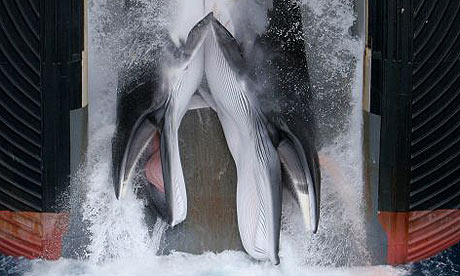Europe plans to hunt more whales than Japan for the first time in many years, dividing EU countries and dismaying conservationists who say that whaling is escalating in response to the worldwide recession.
Figures seen by the Guardian before a meeting of more than 80 countries next week, show that Norway, Denmark and Iceland propose to hunt 1,478 whales compared to Japan's 1,280 in 2009. This would be an increase of nearly 20% by Europe on last year.
"Europe likes to point the finger at Japan as a rogue whaling nation but Europeans are killing whales in increasing numbers in their own waters. Europe has become whale enemy number one", said Kate O'Connell, campaigner for the Whale and Dolphin Conservation Society (WDCS).
Iceland – which today began its 2009 hunt by killing the first two of 150 fin whales – and Norway, are the only two countries to hunt whales commercially. This breaches a 23-year-old worldwide moratorium introduced to preserve critically endangered whale populations.
This year, Norway proposes to kill 885 minke whales, and Iceland 350 whales in total. Denmark will apply to hunt 245 on behalf of indigenous Inuit hunters in its semi-autonomous territory Greenland. Most of the whale meat caught in European waters will be sold to Japan.
Japan, which practises thinly disguised commercial whaling under the guise of scientific research, plans to kill 850 whales in Antarctic waters this season, as well as more than 400 in the Pacific. It wants to kill fewer whales than last year but is seeking permission to hunt more in its coastal waters.
Britain today increased diplomatic pressure on Iceland to stop its whaling, warning that it intended to make it a condition of the country's expected application to join the EU that it abandon commercial whaling. Fisheries minister Huw Irranca-Davies said: "If Iceland were to join Europe then Britain would expect they would be obliged to end their whaling operation. We would urge renegotiation."
A spokesman for the new Iceland government said: "The government has said it will honour this year's quota but will reassess the whaling situation by the end of the year. A study is being done by the economic institute of the University of Iceland. Whaling will obviously be part of the talks when Iceland negotiates its entry to the EU."
An independent economic report commissioned by conservation groups WWF and WDCS released today in advance of the International whaling commission (IWC) summit in Madeira, concludes that whaling is no longer economically viable.
Japan, it claimed, has spent $164m (£100m) backing its whaling industry since 1988, and Norwegian subsidies equal almost half of the gross value of all whale-meat landings. Sales of whale meat, blubber, and other whale products in Japan "have made financial losses for most of the last 20 years", it said.
The research says that killing more whales will only hurt the growing whale-watching industry, and damage the international image of Norway and Japan. "Norway and Japan are hurting tourism, a potential growth industry in both countries in order to spend millions of dollars obtaining whale meat, the sale of which makes no profit. How much longer are they going to keep wasting their taxpayer's money?" said a spokeswoman for WWF.
Earlier this year more than 115,000 people pledged to visit Iceland as soon as the government announced an end to whaling.
The number of pro- and anti-whaling countries are finely balanced within the IWC, with both sides continuing to recruit as many countries as possible to boost their positions. Japan in the past has offered many small countries development aid to vote with them, but Britain and other countries have also leaned on eastern European countries to join.
Australia and New Zealand said this week that they would mount a non-lethal whale research expedition to the Antarctic, as a direct challenge to Japan's research programme, which maintains it must kill whales to study them. The six-week expedition aims to prove that whales needn't be killed for study, the two governments said in a joint statement.
The IWC meeting is being held amidst are fears that environment groups are stepping up campaigns to stop whaling. A previously unknown Norwegian group called Agenda 21 attacked a whaling ship in April, bringing to six the number of whaling boats sabotaged in Norway.
Sea Shepherd, a radical California-based group which has admitted sabotaging whalers in Iceland and elsewhere, has also threatened to return to Europe.
Today , the Icelandic whaling ship Hvalur 9 returned to the Hvalfjord whaling station to process its first catch.
FLASHPOINTS
GREENLAND: The semi-autonomous Danish territory wants to hunt 50 endangered fin whales for indigenous consumption, but most of the meat will be sold to Japan
RUSSIA: Oil companies on the Sakhalin peninsular in the far east of Russia threaten feeding grounds of critically endangered whales
NORWAY: The Lofoten islands are the centre of Norwegian whaling, but also target of anti-whaling groups
ANTARCTICA: The entire sea around Antarctica has been declared a whale sanctuary but Japan regularly hunts whales there
ICELAND: Government may be forced to stop whaling if it wants to joins EU











